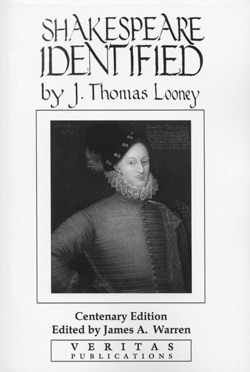Video: Stritmatter Centennial Presentation, March 4, 2020
by Bryan H. Wildenthal
Roger Stritmatter’s Centennial Symposium presentation, “Discovering Shakespeare’s Bible: My Journey From Rebel Graduate Student to Marginalized Professor,” is now available on the SOF YouTube channel.
 The SOF “Shakespeare” Identified Centennial Symposium was held on March 4, 2020, at the National Press Club in Washington, D.C., 100 years to the day after the publication of “Shakespeare” Identified in Edward de Vere the Seventeenth Earl of Oxford. That historic 1920 book by British scholar J. Thomas Looney launched the modern Oxfordian theory of Shakespeare authorship.
The SOF “Shakespeare” Identified Centennial Symposium was held on March 4, 2020, at the National Press Club in Washington, D.C., 100 years to the day after the publication of “Shakespeare” Identified in Edward de Vere the Seventeenth Earl of Oxford. That historic 1920 book by British scholar J. Thomas Looney launched the modern Oxfordian theory of Shakespeare authorship.
Professor Stritmatter was the final speaker at the March 4 celebration. The keynote lecture by James A. Warren is already posted on YouTube, as are the presentations by the late Tom Regnier, Cheryl Eagan-Donovan, and Bonner Miller Cutting. Stritmatter’s lecture sums up the influence of the Oxfordian theory on Shakespeare studies over the past century. He offers a unique perspective from his personal journey as a Shakespearean scholar.
Stritmatter is Professor of Humanities at Coppin State University in Baltimore. He has been deeply engaged in Shakespeare studies for three decades, publishing numerous scholarly articles in leading mainstream peer-reviewed journals, including Review of English Studies, Shakespeare Yearbook, Notes and Queries, Critical Survey, and Cahiers Élisabéthains. He is co-author (with Lynne Kositsky) of On the Date, Sources, and Design of Shakespeare’s The Tempest (2013), which has earned well-deserved praise from mainstream scholars and which refutes the argument that The Tempest could not have been written prior to Oxford’s death in 1604. He is also co-author, with acclaimed British writer Alexander Waugh, of the forthcoming New Shakespeare Allusion Book, and has published numerous articles in the SOF’s peer-reviewed scholarly journals, The Oxfordian (1998 to the present) and Brief Chronicles (2009–16).
Professor Stritmatter’s 2001 Ph.D. thesis, The Marginalia of Edward de Vere’s Geneva Bible, a modern classic and tour de force of Shakespearean scholarship, explores parallels between biblical references in the works of Shakespeare and hundreds of hand-marked verses in Oxford’s personal copy of the Geneva Bible. He shows that among 81 biblical verses on which Shakespeare drew most often (referenced four times or more in the Shakespeare canon), more than a third were marked in de Vere’s Bible, evidently during his lifetime and in his own hand. The quantitative scope of these parallels is matched, furthermore, by their often remarkable qualitative depth.

As Justice John Paul Stevens of the U.S. Supreme Court stated in a letter dated August 3, 2001, congratulating Stritmatter on his landmark study: “You demonstrate that the owner of the de Vere Bible had the same familiarity with its text as the author of the Shakespeare Canon.”
Professor Stritmatter was honored in 2013 as Oxfordian of the Year. He currently edits the Brief Chronicles series of scholarly books published by the SOF. The first volume focuses on the early known poetry of Edward de Vere, documenting hundreds of echoes and parallels in the “Shakespeare” poems and plays — and demolishing long-touted Stratfordian arguments that de Vere’s early poetry somehow represents a weak point of the Oxfordian case. On the contrary, these early poems emerge as stunningly powerful evidence corroborating Looney’s Oxfordian hypothesis.
The biblical and poetic parallels explored by Stritmatter are merely two among four independent and mutually corroborating bodies of evidence for Edward de Vere as the true “Shakespeare.” The other two categories are: (1) biographical parallels to events, travels, and relationships of de Vere’s life, explored for example in Mark Anderson’s book, “Shakespeare” By Another Name (2005), and Cheryl Eagan-Donovan’s documentary, Nothing Is Truer Than Truth (2018); and (2) epistolary parallels to language and perspectives in de Vere’s known personal letters, explored by scholars including William Plumer Fowler, Joseph Sobran, Gary Goldstein, and Bonner Miller Cutting.
Stritmatter was introduced on March 4 by the Centennial Symposium moderator, award-winning journalist and author Bob Meyers, who served formerly as president of the National Press Foundation and director of the Harvard Journalism Fellowship for Advanced Studies in Public Health.
[published June 30, 2020, updated 2021]
Membership dues cover only a fraction of our budget, including all our research, preservation and programming. Please support the SOF by making a gift today!
Blue Boar Tavern: Wassail Q&A
Tuesday Dec. 17, 8pm E / 5pm P
Sign up below for event invites!
